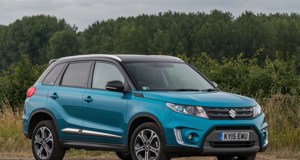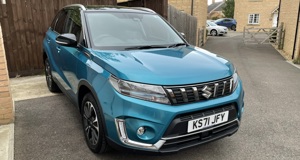Suzuki Vitara Review 2025
Suzuki Vitara At A Glance
Insurance Groups are between 11–23
On average it achieves 88% of the official MPG figure
The Suzuki Vitara name is synonymous with no-nonsense reliability, value for money and low running costs. And, while there are posher rivals out there, the latest Vitara combines all these desirable attributes with a spacious cabin while also being surprisingly fun to drive.
One of the very first small SUVs, the Suzuki Vitara has now been on sale for more than 30 years. The latest model hasn't been around quite that long, but it has been on the market longer than many of its rivals – cars like the Ford Puma, Skoda Kamiq and latest Nissan Juke, to name just a few.
The Suzuki Vitara does things its own way, though. While some crossovers arguably put style over substance, Suzuki's reliability record means the Vitara should last considerably longer than the average PCP cycle. And, unusually for an SUV of this size, it's available with four-wheel drive. No, it's not going to follow in the tracks of a Land Rover Defender, but it'll hold its own on an untreated rural road.
There have been a number of engines offered in the Suzuki Vitara since the latest iteration went on sale in 2015. We liked the little 1.0-litre BoosterJet – a turbocharged three-cylinder unit with a surprising amount of get-up-and-go – but it didn't last long, offered for a brief period from 2018.
Today, you can get the Suzuki Vitara with a choice of a 1.4-litre mild-hybrid petrol engine or a new 1.5 'full' hybrid. Both offer pretty similar fuel economy stats on paper, with the mild-hybrid model providing a combined WLTP figure of 52.7 while the full hybrid scrapes 53.0mpg – both considerably less than the 64.2mpg you can expect to see from certain Toyota Yaris Cross models.
They're not quick, either. While you don't buy a car like this for performance, the Vitara Hybrid's leisurely 12.7-second 0-62mph time could soon become frustrating when joining the motorway. Even more irritating is the slightly annoying automated manual transmission – the electrical assistance only goes some way towards smoothing over clumsy gear changes.
Still, the Suzuki Vitara's quite fun to drive in a sense. It feels a bit like a Swift-on-stilts, with loads of grip and a small turning circle. It does lean in bends more than, say, a Ford Puma or SEAT Arona, but it's much more car-like to drive than the Suzuki Jimny.
The Suzuki Vitara's interior is feeling a little dated compared to the best in class, although it has received minor updates and improvements over the years. A facelift in 2019 brought with it some welcome additions in the form of a new instrument cluster and some additional soft-touch materials, but otherwise it's pretty much the same as when it was launched in 2015.
With a boxier shape than a Nissan Juke, the Vitara's cabin is surprisingly practical for a small SUV. Access is easy (thanks to wide-opening doors), while you sit higher than you do in a regular hatchback – giving you a good view of your surroundings and a generally increased feeling of safety.
Talking of which, Euro NCAP awarded the Suzuki Vitara a full five stars out of five when it was crash tested back in 2015. You get seven airbags as standard, while the latest models come with things like lane-assist tech (which can nudge you back into your lane if you inadvertently start to stray) and an autonomous braking system that can help prevent (or at least reduce the severity of) a crash.
While there have been a few Suzuki Vitara derivatives over the years, the range is now made up simply of two models: the Vitara SZ-T and the Vitara SZ-5. Both are generously equipped for the money, with the SZ-T starting from a shade under £24,000 and including 17-inch alloy wheels, adaptive cruise control, automatic air conditioning and Apple CarPlay/Android Auto.
The Suzuki SZ5 is closer to £26,000 and comes with a panoramic sunroof, dual-sensor brake support, keyless entry/start and 17-inch polished alloy wheels.
We lived with a Vitara for six months - find out how we got on with it in our Suzuki Vitara long term test.
Suzuki Vitara handling and engines
- Engines range from 1.0 BoosterJet to 1.6 DDiS ALLGRIP Automatic
- Readers report Real MPG to be between 30–71 mpg
Suzuki Vitara 2025: Handling and ride quality
One of the surprising things about the Vitara is how well it drives. It's no sports car, but for an SUV of this size, it's very reassuring in corners with responsive (albeit quite light) steering. True, there's a fair bit of body roll, but there's also no shortage of front end grip.
It rides well, too – indeed, instead of crashing and banging over every pothole, it manages to absorb obstacles with ease. Even choosing the turbocharged Vitara S with its firmed-up suspension doesn't create an uncomfortable ride.
Refinement is another area that impresses. Even at motorway speeds there's little wind or road noise, the Vitara feeling stable and composed. In fact, it makes a very comfortable long distance companion, helped by a good driving position and decent seats.
Suzuki Vitara 2025: Engines
The original Suzuki Vitara engine line-up included a 1.6-litre petrol and diesel engine, both with 120PS, which provide adequate if not sparkling performance. The petrol was also available with an automatic gearbox.
Shortly after, the Vitara S was launched, powered by Suzuki's excellent 1.4-litre BoosterJet engine with 140PS and a six-speed manual gearbox. It gave the Vitara a real turn of pace and made it genuinely fun to drive – not something you'd necessarily expect from a Vitara.
When the Vitara was facelifted in 2019, Suzuki dropped the 1.6-litre engines (not replacing the diesel) and introduced the 1.0 BoosterJet engine. It's a three-cylinder engine, so has that nice low down torque, yet at speed it's quiet and smooth. The only downside is that it uses a five-speed gearbox rather than a six, but even at motorway speeds, it's quiet and doesn't feel strained.
In keeping with modern trends, the Suzuki Vitara engine line-up is now a hybrid-only affair. The choices include a 1.4 mild-hybrid or a 1.5 not-quite-so-mild hybrid (or 'full hybrid', in Suzuki terms). Neither will travel any significant distance under electric power, but the electrical assistance provides a small boost in performance and helps improve fuel economy.
We prefer the mild-hybrid unit, mainly because it's a bit peppier (the full hybrid takes 12.7 seconds to reach 62mph, compared to the mild's slightly more competitive 9.5 seconds). That relaxed acceleration figure is largely down to the slightly-too-relaxed automated manual gearbox which stumbles over changes and can be a real pain when you're trying to build speed quickly.
One welcome oddity of the Vitara range over the years has been the option of all-wheel drive. Most buyers will be better sticking to front-wheel-drive models, but the Suzuki Vitara Allgrip provides a little extra reassurance if you live in a rural area or regularly need to venture off the beaten track.
Suzuki Vitara 2025: Safety
When Euro NCAP last crash-tested the Suzuki Vitara in 2015, it was awarded a full five stars for safety. That rating has now expired, however, and it's possible that the Vitara wouldn't perform quite so well in the latest, more stringent tests.
Fundamentally, though, the Suzuki Vitara is a very safe car. You get a generous amount of safety technology, too, intended to help reduce the chances of a collision. Sensors and cameras on the front of the car work together to detect a potential issue, while the Dual Sensor Brake Support can apply the brakes if necessary. The Blind Sport Monitor will notify you if there's another vehicle in your blind spot, while the Lane Departure Prevention will niudge the steering if you start to unintentionally stray from your lane.
Suzuki Vitara 2025: Towing
Mild-hybrid Suzuki Vitara models can tow a braked trailer weighing up to 1500kg while the full hybrid is rated up to 1200kg. It's generally advised that inexperienced towers shouldn't exceed more than around 85 per cent of the car's kerb weight – following this rule, you'll be limited to around 1100kg. That'll be plenty for a small trailer or perhaps a lightweight caravan, but you might want to look at a bigger SUV if you're planning some serious towing.
| Engine | MPG | 0-62 | CO2 |
|---|---|---|---|
| 1.0 BoosterJet | 53 mpg | 11.5 s | 123 g/km |
| 1.0 BoosterJet ALLGRIP | 50 mpg | 12.0 s | 130 g/km |
| 1.0 BoosterJet Automatic | 50 mpg | 12.5 s | 127 g/km |
| 1.4 BoosterJet | 49–52 mpg | 9.5–10.2 s | 127–131 g/km |
| 1.4 BoosterJet ALLGRIP | 46 mpg | 10.2 s | 139–140 g/km |
| 1.4 BoosterJet ALLGRIP Automatic | 45–51 mpg | 10.2 s | 128–143 g/km |
| 1.4 BoosterJet Automatic | 48 mpg | 9.5 s | 129–133 g/km |
| 1.5 Hybrid | - | - | 121 g/km |
| 1.5 Hybrid Allgrip | - | - | 132 g/km |
| 1.6 | 50–53 mpg | 11.5–13.0 s | 123–131 g/km |
| 1.6 ALLGRIP | 50–53 mpg | 12.0 s | 123–130 g/km |
| 1.6 ALLGRIP Automatic | 50 mpg | 13.0 s | 131 g/km |
| 1.6 Automatic | 51–53 mpg | 12.5 s | 123–127 g/km |
| 1.6 DDiS | 71 mpg | 11.5 s | 106 g/km |
| 1.6 DDiS ALLGRIP | 67 mpg | 12.4 s | 111 g/km |
| 1.6 DDiS ALLGRIP Automatic | 63 mpg | 12.4 s | 118 g/km |
Real MPG average for the Suzuki Vitara

Real MPG was created following thousands of readers telling us that their cars could not match the official figures.
Real MPG gives real world data from drivers like you to show how much fuel a vehicle really uses.
Average performance
88%
Real MPG
30–71 mpg
MPGs submitted
732
Suzuki Vitara interior
- Boot space is 375–710 litres
- Euro NCAP rating of five stars
| Dimensions | |
|---|---|
| Length | 4175 mm |
| Width | 1775 mm |
| Height | 1610 mm |
| Wheelbase | 2500 mm |
Suzuki Vitara 2025: Practicality
The Suzuki Vitara's seats are comfortable, and it's easy to find a good driving position. The steering wheel adjusts for height and reach, while all the controls are logically placed.
Visibility is excellent – aided by the Vitara's high seating position and large windows – while legroom is adequate, although taller passengers may complain if they're sat in the rear for any length of time.
The boot is one of the biggest in its class, and it's easily accessed (although obviously higher than an estate or hatchback). There's a bag hook and an auxiliary socket in the load area, while underfloor storage could come in handy.
If you wish to drop the rear seats to create extra room, they don't fold entirely flat. Thanks to the Vitara's fairly boxy dimensions there is, however, plenty of space when the seats dropped. There are handy touches like plastic guides for the Isofix mounts – useful if you're fitting a child seat.
Suzuki Vitara 2025: Quality and finish
With an overload of harsh plastics, the Suzuki Vitara's cabin does at least feel durable – if not exactly cosseting. The way the doors close with a tinny clang add to the slightly downmarket vibe. We haven't heard many reports of bits of trim breaking or falling off, though, which is good.
Suzuki Vitara 2025: Infotainment
The Vitara's seven-inch media system is dated simply by its position on the dashboard – it's lower down than most, meaning it looks more integrated, but not as handy for glancing at on the move. The graphics look a bit aftermarket, too, although you do at least get Apple CarPlay and Android Auto as standard (meaning you can access apps on your phone through the car's in-built display).
Suzuki Vitara value for money
Suzuki Vitara 2025: Prices
Prices start from around £24,000 for a Suzuki Vitara SZ-T mild hybrid, increasing to £27,500 for an SZ5 full hybrid. That's similar money to a Toyota Yaris Cross and Ford Puma, both of which feel better finished than the ageing Suzuki Vitara. Still, you get a decent amount of standard equipment for your cash, and Suzuki dealers tend to offer some tempting pre-reg deals.
You can, of course, save even more money by looking for an older second-hand Suzuki Vitara. Around £8500 will get you a 2017 Suzuki Vitara SZ-T, while a three-year-old example could be yours from just £12,000.
Suzuki Vitara 2025: Running Costs
Despite its SUV appearance, the Suzuki Vitara should be a very affordable car to run. The latest mild-hybrid models return up to 52.7mpg in official WLTP fuel economy tests, while the full hybrids manage up to 53.0mpg.
According to our Real MPG data, older models perform well in the real world but, unsurprisingly, it's the diesels that are the most efficient – readers report seeing around 60.0mpg from the 1.6 DDiS with the manual gearbox.
Suzuki recommends servicing once a year or every 12,500 miles (whichever comes sooner), while the brand's service plans fix prices for parts and labour for up to three years.
VED (car tax) for the latest hybrid and mild-hybrid Suzuki Vitaras will be £155/year – that's £10 a year less than a straightforward petrol model.
Satisfaction Index
 What is your car like to live with?
What is your car like to live with?
We need your help with our latest Satisfaction Index, so that we can help others make a smarter car buying decision. What's it like to live with your car? Love it? Loath it? We want to know. Let us know about your car - it will only take a few minutes and you could be helping thousands of others.
Help us with the Honest John Satisfaction Index nowSuzuki Vitara models and specs
The Suzuki Vitara SZ-T comes with LED projector headlights, Dual Sensor Brake Support, Lane Departure Warning, Lane Departure Prevention, Rear Cross Traffic Alert, Traffic Sign Recognition, Blind Spot Monitor, Adaptive Cruise Control, a chrome front grille, silver roof rails, 17-inch alloy wheels, front/rear fog lamps, automatic air conditioning, DAB radio, Bluetooth, Apple CarPlay/Android Auto.
The Suzuki Vitara SZ5 adds 17-inch polished alloy wheels, a panoramic sunroof, suede seat fabric, navigation, keyless entry and start, front/rear parking sensors and electric folding door mirrors.
| Dimensions | |
|---|---|
| Length | 4175 mm |
| Width | 1775 mm |
| Height | 1610 mm |
| Wheelbase | 2500 mm |
| Miscellaneous | |
|---|---|
| Kerb Weight | 1075–1325 kg |
| Boot Space | 375–710 L |
| Warranty | 3 years / 60000 miles |
| Servicing | 9000–12500 miles |
| Costs | |
|---|---|
| List Price | £22,994–£29,034 |
| Insurance Groups | 11–23 |
| Road Tax Bands | B–F |
| Official MPG | 44.8–70.6 mpg |
| Euro NCAP Safety Ratings | |
|---|---|
| Adult | - |
| Child | - |
| Pedestrian | - |
| Overall | 5 |
Currently on sale
| SUV | |||
|---|---|---|---|
| Version | List Price | MPG | 0-62 |
| GO Boosterjet 129 MHEV Start/Stop 5dr | £22,994 | - | - |
| SZ5 115 Start/Stop 5dr Auto | £27,264 | - | - |
| SZ5 Allgrip 115 Allgrip Start/Stop 5dr Auto | £29,034 | - | - |
| SZ5 Allgrip Boosterjet 129 Allgrip MHEV Start/Stop 5dr | £25,549 | - | 10.2 s |
| SZ5 Boosterjet 129 MHEV Start/Stop 5dr | £23,749 | - | 9.5 s |
| SZ-T 115 Start/Stop 5dr Auto | £25,274 | - | - |
| SZ-T Allgrip Boosterjet 129 Allgrip MHEV Start/Stop 5dr | £25,549 | - | 10.2 s |
| SZ-T Boosterjet 129 MHEV Start/Stop 5dr | £23,749 | - | 9.5 s |
On sale until January 2023
| SUV | |||
|---|---|---|---|
| Version | List Price | MPG | 0-62 |
| SZ-T Boosterjet 129 MHEV Auto Start/Stop 5dr | £25,099 | - | 9.5 s |
On sale until November 2022
| SUV | |||
|---|---|---|---|
| Version | List Price | MPG | 0-62 |
| SZ4 Boosterjet 129 MHEV Start/Stop 5dr | £22,579 | - | 9.5 s |
| SZ5 Allgrip Boosterjet 129 Allgrip MHEV Auto Start/Stop 5dr | £28,689 | - | 10.2 s |
| SZ5 Boosterjet 129 MHEV Auto Start/Stop 5dr | £25,099 | - | 9.5 s |
On sale until March 2021
| SUV | |||
|---|---|---|---|
| Version | List Price | MPG | 0-62 |
| 1.0 Boosterjet SZ4 5dr | £16,993 | 53.2 mpg | 11.5 s |
| 1.0 Boosterjet Sz-T 5dr | £18,993 | 53.2 mpg | 11.5 s |
| 1.0 Boosterjet Sz-T Allgrip 5dr | £20,793 | 49.5 mpg | 12.0 s |
| 1.0 Boosterjet Sz-T Auto 5dr | £20,343 | 49.5 mpg | 12.5 s |
| 1.4 Boosterjet SZ5 5dr | £22,493 | 48.7 mpg | 9.5 s |
| 1.4 Boosterjet SZ5 Allgrip 5dr | £24,293 | 46.3 mpg | 10.2 s |
| 1.4 Boosterjet SZ5 Allgrip Auto 5dr | £25,643 | 44.8 mpg | 10.2 s |
| 1.4 Boosterjet SZ5 Auto 5dr | £23,843 | 47.8 mpg | 9.5 s |
| 1.4 Boosterjet Sz-T 5dr | £19,993 | 48.7 mpg | 9.5 s |
| 1.4 Boosterjet Sz-T Auto 5dr | - | - | - |
On sale until November 2018
On sale until April 2017
| SUV | |||
|---|---|---|---|
| Version | List Price | MPG | 0-62 |
| 1.6 Sz-T + Rugged Pack Auto 5dr | £18,933 | 53.3 mpg | - |
| 1.6 Sz-T + Urban Pack Auto 5dr | £18,853 | 53.3 mpg | - |
| 1.6 Sz-T Allgrip + Rugged Pack 5dr | £19,383 | 53.3 mpg | - |
| 1.6 Sz-T Allgrip + Urban Pack 5dr | £19,303 | 53.3 mpg | - |
| 1.6 Sz-T Allgrip 5dr | £18,633 | 53.3 mpg | - |
| 1.6 Sz-T Auto 5dr | £18,183 | 53.3 mpg | - |
| 1.6 Sz-T Kuro 5dr | £17,583 | 53.3 mpg | - |
On sale until October 2015
| SUV | |||
|---|---|---|---|
| Version | List Price | MPG | 0-62 |
| 1.6 DDIS 120 SZ5 Auto | £21,149 | - | - |
Model History
- October 2014: New Vitara unveiled
- February 2015: Specifications and prices announced
- June 2015: New automatic Vitara launched
- September 2015: Vitara S launched
- January 2018: Vitara Kuro launched
- July 2018: Vitara 2019 model year announced
- November 2018: Suzuki Vitara prices announced
- May 2019
- December 2019: Suzuki mild hybrids announced
- June 2020: Suzuki Vitara mild-hybrid priced from £21,749
- March 2022: Suzuki Vitara Hybrid priced from £25,499
- November 2024: Suzuki Vitara updated for 2025
October 2014
New Vitara unveiled
The new five door car is named Vitara and it marks the return of the famous badge first used by Suzuki more than 25 years ago, also on a small SUV.
4,175mm long x 1,775mm wide x 1,610mm high, on a 2,500mm wheelbase.
Wheels and tyres: 16" alloy with 215/60 R16 tyres or 17" alloy with 215/55 R17 tyres.
On sale in the UK from April 2015, the all-new Vitara is available with optional ALLGRIP intelligent four wheel drive with petrol and diesel engines that offer low CO2emissions as well as outstanding fuel economy in the sector.
February 2015
Specifications and prices announced
Vitara SZ4 has seven airbags, 16-inch alloy wheels, DAB Radio with USB and Bluetooth connectivity, Cruise control with speed limiter, auto air conditioning, front and rear electric windows and projector headlamps.
Vitara SZ-T adds 17-inch silver painted alloy wheels, rear privacy glass, Smartphone link audio and navigation system.
Vitara SZ5 adds LED Projector headlights, 17-inch polished alloy wheels, suede seat fabric, keyless entry with start button, Adaptive Cruise Control, Radar Brake Support and Panaoramic sunroof.
1.6 SZ4 £13,999
1.6 SZ-T £15,499
1.6 SZ5 ALLGRIP 4WD £17,999
1.6 DDiS SZ-T £16,999
1.6 DDiS SZ5 £19,499
1.6 SSiS SZ5 ALLGRIP 4WD £21,299
Urban Pack of fog lamp bezels (chrome-plated), body-side mouldings, and a roof spoiler(for SZ-T and SZ5) £500
Rugged Pack of front and rear skid plates, fog lamp bezels, body-side mouldings, and loading edge protection (for SZ-T and SZ5) £500
Metallic Paint (all models) £430
Dual-tone Paint (for SZ-T and SZ5) £800
The 2015 Suzuki Vitara is powered by the M16A 1.6-litre petrol engine or the D16AA 1.6-litre DDiS Fiat sourced diesel engine. With the petrol option, friction reductions combined with weight savings in the engine and related components help achieve excellent fuel economy together with high output and torque.
|
|
Petrol |
Diesel |
|
Maximum output |
120PS /6,000rpm |
120PS /3,750rpm |
|
Maximum torque |
156Nm/4,400rpm |
320Nm/1,750rpm |
Emissions for the petrol engine with two wheel drive / manual transmission are 123g/km and 127g/km for the petrol engine with two-wheel drive / six-speed automatic transmission.
Four-wheel drive is typically seen as detrimental to fuel economy and emissions performance. By contrast, Suzuki's ALLGRIP system enables CO 2 emissions that are remarkably low for a four-wheel drive SUV with figures of 130g/km with five-speed manual transmission and 131g/km with six-speed automatic transmission.
The new Vitara also has outstandingly low emissions with the DDiS engine, emitting just 106g/km with two-wheel drive / six-speed manual transmission and 111g/km with four-wheel drive / six-speed manual transmission.
June 2015
New automatic Vitara launched
A new six-speed fully automatic transmission is now available on the SZ5 petrol model in either two wheel drive or ALLGRIP versions and is also a £1,350 option.
CO2 emissions for the petrol engine are 127g/km with two wheel drive / automatic transmission which is just 4g/km higher than for the manual transmission model.
September 2015
Vitara S launched
Gets new 1.4 litre chain cam turbo petrol BoosterJet engine developing 140PS and 220Nm torque from 1500 to 4000rpm. 4 wheel drive. 6-speed manual transmission. 52.3mph combined and 127g/km CO2 in ECDC tests. Top speed 120mph. 6-speed 'automatic' is twin clutch TCSS, not torque converter.
January 2018
Vitara Kuro launched
Based again on the 1.6-litre SZ-T 2WD manual transmission model with auto air conditioning, satellite navigation, Smartphone link audio and rear privacy glass as standard equipment, Kuro offers a unique specification and £1700 added customer value for a premium of just £750 over the SZ-T.
Kuro offers a very high and unique specification including ‘Misti’ satin black alloy wheels, Black front bumper and side body moulding set, Black door mirrors, Black rear upper spoiler, Black front grille and side trims and Kanji ‘Kuro’ badge. For the interior, the colour design theme continues with Piano Black to dashboard, ventilation trim ring set and centre console trim. A Carbon effect centre analogue clock is also included as standard.
Kuro is available in four colours which are Superior White as a solid colour and Cosmic Black, Galactic Grey and Silky Silver as optional metallic colours available at £500.
July 2018
Vitara 2019 model year announced
The updated Vitara is available with both 1.0-litre and 1.4-litre Boosterjet turbo charged petrol engines as introduced in the S-Cross model range late last year and these will replace the 1.6-litre petrol engine.
The highly acclaimed Boosterjet engines provide more power and torque, greater efficiency and offer lower emissions too. SZ4 and SZ-T grades are equipped with the 1.0-litre 111PS Boosterjet engine and ALLGRIP four wheel drive is available optionally on the SZ-T with manual transmission.
SZ5 models are equipped with the 1.4-litre Boosterjet engine which offers a power output of 140PS and 220Nm of torque is available from just 1,500rpm through to 4,000rpm. WLTP fuel consumption and CO 2 emission figures for both engines will be available closer to the launch date.
The latest Vitara also offers various design updates, two new colours and the availability of new technology and advanced safety equipment.
For the exterior, new design alloy wheels are available, a redesigned front grille and lower bumper is utilised and the rear of the car features new design and distinctive LED combination lamps. For the interior, the upper instrument panel now incorporates a soft touch material for added quality and the instrument cluster has a new design with colour central information display.
November 2018
Suzuki Vitara prices announced
1.0 Boosterjet SZ4 2WD 5-speed manual 139g/km CO2 WLTP £16,999
1.0 Boosterjet SZ-T 2WD 5-speed manual 139g/km CO2 WLTP £18,999
1.0 Boosterjet SZ-T AT 2WD 6-speed TCSS automatic 153g/km CO2 WLTP £20,349
1.0 Boosterjet SZ-T ALLGRIP 5-speed manual 162g/km CO2 WLTP £20,799
1.4 Boosterjet SZ-T 2WD 6-speed manual 146g/km CO2 WLTP £19,999
1.4 Boosterjet SZ5 2WD 6-speed manual 146g/km CO2 WLTP £20,499
1.4 Boosterjet SZ5 AT 2WD 6-speed TCSS automatic 146g/km CO2 WLTP £23,849
1.4 Boosterjet SZ5 ALLGRIP 6-speed manual 169g/km CO2 WLTP £24,299
1.4 Boosterjet SZ5 ALLGRIP 6-speed automatic TCSS 174g/km CO2 WLTP £25,649
December 2019
Suzuki mild hybrids announced
Suzuki has revealed plans to add three 48-volt mild hybrid models to itrs range from Spring 2020.
The new mild-hybrid engine will be introduced for Swift Sport, Vitara and S-Cross models and offer up to 20 per cent lower CO2 emissions, a greater level of torque and 15 per cent overall improvement in WLTP Combined fuel consumption. These models will directly replace the current 1.4-litre Boosterjet derivatives with manual transmission.
Similar in basic principle to the 12V Hybrid SHVS (Smart Hybrid Vehicle by Suzuki) system that Suzuki pioneered in 2016 and fitted to all manual transmission models in the Ignis range and Swift SZ5 models, the newly developed 48V Hybrid Powertrain remains very lightweight in design and the components add less than 15kg to the overall weight of the vehicle.
The new and higher-powered Suzuki SHVS system consists of a 48V lithium-ion battery, Integrated Starter Generator (known as ISG) and 48V-12V (DC/DC) converter to power components requiring lower voltage including lights, audio and air conditioning. The ISG acts as both a generator and starter motor, is belt driven and assists the petrol engine during vehicle take off for a higher level of torque with 235Nm available from 2,000rpm.
The compact and high-performance lithium-ion battery stores electrical energy recovered from deceleration and braking and incorporates an idle stop function operated via the Integrated Starter Generator. This battery, along with the DC/DC convertor unit, are located under the front seats to assist overall weight distribution.
A further benefit of the new 48V Hybrid system is the introduction of electric motor idling when the clutch is disengaged and the engine speed is approximately 1,000rpm. This feature essentially replaces fuel injection with power from the electric motor to then control and maintain engine idling at vehicle speeds below 10mph and when stationary.
This function therefore eliminates fuel consumption under these conditions as engine momentum is electrically controlled by the ISG unit and the car is ready to re-accelerate on request with no engine restart delay.
Further detail and full specifications of the three new Hybrid models will be announced in advance of media and public launch which is planned for March 2020.
June 2020
Suzuki Vitara mild-hybrid priced from £21,749
Orders are now being taken for the Vitara 1.4 Boosterjet Hybrid, with Suzuki offering 0% finance and a seven-day return policy.
Prices are as follows:
|
Vitara 1.4 Boosterjet Hybrid SZ4 |
£21,749 |
|
Vitara 1.4 Boosterjet Hybrid SZ-T |
£22,749 |
|
Vitara 1.4 Boosterjet Hybrid SZ5 |
£24,749 |
|
Vitara 1.4 Boosterjet Hybrid SZ5 ALLGRIP |
£26,549 |
March 2022
Suzuki Vitara Hybrid priced from £25,499
The Suzuki Vitara is now available with full Hybrid technology that helps lower CO2 emissions and improve fuel consumption even further compared to the mild hybrid with Automatic Transmission.
Standard equipment for all models is comprehensive and the SZ-T includes seven airbags, LED multireflector headlamps for low and high beam, USB and Bluetooth connectivity, Traffic Sign Recognition, Blind Spot Monitor, Adaptive Cruise Control, auto air conditioning and front and rear electric windows, keyless entry and start, 17-inch silver painted alloy wheels, rear privacy glass, white stitching for seat trim fabric, Smartphone link audio and navigation system.
Moving up to SZ5 adds 17-inch polished alloy wheels, suede seat upholstery, Panoramic sunroof, front and rear parking sensors and availability of ALLGRIP 4WD as an option.
The Vitara is available in a total of 11 different shades of which one is a solid colour. All others include metallic finish and six are dual-tone metallic with Cosmic Black roof colour.
The Vitara Full Hybrid range is priced at £25,499 for SZ-T, £27,499 for SZ5 2WD and £29,299 for the SZ5 ALLGRIP model. Zero per cent finance is now available on Full Vitara Hybrid models until the end of June 2022.
Taking the best selling SZ-T model as an example on Personal Contract Purchase, a deposit of £4,485 would be required followed by 48 monthly payments of just £249 and a final optional payment of £8,702 to keep the car at the end of the agreement.
The new and higher-powered Suzuki system working in conjunction with the latest K15C engine consists of a 140V lithium-ion battery and inverter, Motor Generator Unit (known as MGU), a 12V lithium-ion battery as well as a conventional 12V lead-acid battery to power components requiring lower voltage such as lights, instruments and heating / air conditioning.
The new Hybrid system has two switchable modes which are Eco and Standard. One switch enables the driver to change between the two modes depending on conditions and also increases the frequency of EV driving. In Standard mode operation, the MGU more frequently assists the petrol engine to allow more spirited driving enjoyment.The MGU acts as both a generator and starter motor, is belt driven and assists the petrol engine during vehicle take off.
The high-performance lithium-ion battery stores electrical energy recovered from deceleration and braking and incorporates an idle stop function operated via the Integrated Starter Generator.
Based on engine speed and throttle position, the engine ECU judges when the driver will accelerate and then uses electric motor assist to add additional torque.
Additionally, the hybrid system efficiently collects kinetic energy and generates electricity by stopping the engine and disengaging the clutch during deceleration which expands the EV driving range. As a full Hybrid, Vitara can run on its electric motor alone for short distances.
The Vitara Full Hybrid is equipped as standard with Auto Gear Shift (AGS) that automatically shifts the manual transmission and gear ratios that are optimised to help provide a good combination of performance and fuel economy. This enables the driver to enjoy both the direct driving experience of a manual gearbox and the shifting ease of an Automatic Transmission. Another key advantage is lower component weight versus a conventional torque converter type Automatic. The transmission also has a manual mode with steering wheel mounted shift paddles.
One notable feature of the latest hybrid system with AGS is the position of the Motor Generator Unit on the output side of the transmission assembly. In doing this, output from the MGU is directly transmitted to the driveshafts to fill the torque gap during shifting and provides a smoother transition from the transmission.
The Vitara’s CO2 emissions are low thanks to the use of hybrid technology, high tensile steel and other weight saving measures in the body. Weight savings during initial development help the Vitara remain one of the lightest SUV’s in its class at just 1,268kg with an increase of only 47kg for the SZ5 ALLGRIP model.
Suzuki evolved its renowned four wheel drive technologies into a new generation that delivers driving pleasure and peace of mind in diverse conditions while promoting economy and limiting the burden four wheel drive cars place on the environment.
Suzuki’s ALLGRIP ‘Select’ system is available as an option on the SZ5 model and incorporates four driver-selectable modes for safe, enjoyable driving on diverse surfaces. It debuted in the S-Cross model and has proved very successful.
In development, the Vitara ALLGRIP system was enhanced by the addition of a feed forward function that allocates torque to the rear wheels before any slippage can occur. In summary, rather than reacting after grip is lost, it controls the vehicle to prevent grip from being lost which results in greater stability.
The audio system fitted has a Smartphone Linkage Display Audio (SLDA) with a large seven inch touch panel display that enables intuitive operation. This includes a three dimensional navigation map that makes landmarks easy to distinguish, the system also allows the driver to use certain smartphone applications with MirrorLink, Android Auto and Apple CarPlay connection.
Apple CarPlay is the smarter and safer way to use iPhone in the Vitara. Apart from making calls it also facilitates receiving directions for optimised traffic conditions, listening to music, accessing email, text messages and more.
Standard safety equipment includes seven airbags which includes a driver’s knee airbag as well as seat belt pre-tensioners and force limiters.
November 2024
Suzuki Vitara updated for 2025
The Suzuki Vitara has been updated for 2025. Changes include the fact that the Vitara now uses the same Motion and Ultra grade names as the S-Cross, Swace and Swift models.
Suzuki has revised the Vitara's exterior, with a new front grille and bumper, a fresh design for the 17-inch alloy wheels and the option of Sphere Blue and Cosmic Black dual-tone or Titan Dark Grey single-tone paint.
All models now include Lane Keep Assist, Intelligent Speed Control, a Driver Monitoring System and eCall.
Motion models include a nine-inch media display, wireless smartphone link with Android Auto and Apple CarPlay, Keyless entry and start, High Beam Assist, auto-dimming rear-view mirror, rear parking sensors plus Suzuki Connect connected services that includes three years free subscription.
Ultra grade includes a panoramic sliding sunroof, suede and leather seat fabric, front and rear parking sensors, electric folding door mirrors with built-in indicators and overhead storage console.
Fuel consumption for the Vitara two-wheel drive manual improves by 9% to 53.2mpg. Full hybrid 2WD models with AGS transmissions are 6% more efficient, at 56.4 mpg.
CO2 emissions are lower too, dropping from 119g/km to 113g/km.
What to watch out for
Dan's 'long-term' Suzuki Vitara 1.6DDIS recalled for issue with Radar Brake Support system. Two warning messages had flashed up: “Radar Brake Support FCN Temporarily Disabled” and “Radar Brake Support: Not Active By Sensor”. Essentially the car’s way of letting the driver know not to rely on the radar brake, which detects the vehicle in front when driving at low speeds in heavy traffic. If it senses that you could be about to crash into the car in front, it sounds a (quite irritating) buzzer and flashes up a warning on the information panel. In worst case scenarios it will even do the braking for you, to at least minimise if not necessarily avoid a collision. Suzuki was quick to get the car in and let Dan know that it affected 1163 Vitara SZ5 models. The official reason for the recall is “Due to an error in production the Radar Brake Support System may not have been correctly programmed. In certain instances the system may not recalibrate and could cause unnecessary braking.” Since the Vitara returned from its 30 minute rectification work Dan hasn’t seen the warning messages again and the braking seems to kick-in as expected. So far, so good.
21-02-2016:"Pronounced jerk" reported when 2015 Suzuki Vitara 1.6 petrol automatic is changing from 1st to 2nd.
19-07-2017:Complaint about new Suzuki Vitara SZ5 Automatic 4x4 1.6 petrol, with 1800 miles. When using cruise control eg at 60-70 mph, the automatic gear change seems to become very erratic and undecided, shifting up and down at the slightest incline, making the ride uneven and uncomfortable. Probably because automatic AWD is engaged and the engine isn't powerful enough.
03-10-2017:Complaint of problems with Radar Brake Support on new Suzuki Vitara S 1.4T Boosterjet, purchased 14th August 2017. On the open road, without adaptive cruise control engaged, a warning came up saying that the RBS function was temporarily disabled. Driver stopped and warning disappeared. This was reported to the dealer and the car was taken to him on 12 September. He couldn't find a problem. Then on 15 September, using adaptive cruise control on the M74, the warning reappeared and the car dropped out of cruise control. The car was taken back to the dealer on 29 September. Again, he couldn't find a problem. Finally, the warning came up again on the M6 on 1 October. Adaptive cruise control was not engaged.
04-11-2017:Report of slight grinding feeling from the brakes of a 2017 Suzuki Vitara 1.4T Boosterjet. Probably surface corrosion on the brake discs, but might also be corrosion of the ABS relector rings.
22-02-2018:Report of uneven rear tyre wear on June 2017 Suzuki Vitara, now at 17,500 miles. The outside edge of the original Continental rear tyres is at the wear limit, whereas the inner edge still has 3.5mm. Dealer offered a 20% discount on replacement rear tyres.
25-08-2018:Owner finds gearshift of his 2016 Suzuki Vitara S 1.4T Boosterjet 4WD "rather clunky and not smooth unlike my wife's Swift. When manoeuvring the car at low speeds it is sometimes difficult to get it into gear. This has been the case since new and I have partially grown used to it but just wondered if you had heard any other reports of this from Vitara owners." We think this is probably normal of the heavier duty 4WD Vitara.
11-04-2019:Report of rear sunroof shattering in heavy rain in at just 250 miles in new Suzuki Vitara Allgrip delivered on 27-3-2019. Happily, "Suzuki pulled out all the stops and car has been collected and booked in to be examined." Owner would still wish to praise Eastbourne Motor Company for its sales team and their efforts to find the car from UK stocks at such short notice as well as for its delivery to Isle of Wight resident in Portsmouth. Owner would also like to add his excellent impression of the Suzuki Head Office Customer Service Team who, after a slow start, sprung into action and is hoping to return the car in double quick time, throwing in a courtesy car while the repairs take place.
12-05-2019:Report of uneven rear tyre wear from 2018 Suzuki Vitara SZ5 2WD. Dealer reported it needed a new axle and ordered one. 12 weeks later it had not arrived. Mileage now 12,000. Suzuki will pay half the cost of replacement rear tyres but not the full cost.
27-05-2019:Report of failure of Rader Brake Support on August 2018 Suzuki Vitara S. Tested by Suzuki dealer who agreed to replace it more then 11 weeks ago and is still waiting for the part.
05-08-2019:Report from reader that timing belt of 1.6 DDIS diesel requires replacing every 5 years, but it is an 8 hour engine out job costing arounf £1,000.
20-08-2019:Report that Vitara 1.4T Boosterjet for 2019/69 registration could not be ordered due to problems with RDE1 from September 2019.
17-10-2019:Excessive wear to outer edges of rear tyres reported on 2017 Suzuki Vitara SZ4 1.6 petrol when all four tyres were replaced at 24,000 miles. 2mm more wear to the outside edges on both rear tyres. No tracking adjustment possible. See 22-2-2018 and 12-5-2019.
28-10-2019:Report that Suzuki Vitara 4x4 AllGrip models are being recalled to have their rear axles replaced due to excessive wear of the rear tyres. Recall started more recently than June 2019 and seems that owners are notified when they book their cars in for a service. (See also: 17-10-2019; 12-5-2019 and 22-2-2018.)
13-11-2019:Report of 2016 Suzuki Vitara 2WD needing a new styeering rack because the inner rack joint has become badly worn. (Engineer described as "shot to pieces".) Happily, Suzuki paid for a new steering rack and the dealer pais half the labout out of goodwill leaving the owner with just £100 to pay. Suzuki said there was no history of this problem (we hade none) and even sent out a "master" engineer to look at it.
12-08-2022:
Faulty sat nav and rear-view camera 2022 Suzuki Vitara 1.4 BoosterJet SZ-T Automatic. Sat nav won't accept post codes and the rear-view camera display is described as "fuzzy". Dealer says a batch faulty Pioneer units has been fitted into some Vitaras but they are unable to fix the fault.
06-07-2023:Report of tailgate struts failing on a 2018 Suzuki Vitara. Fortunately, you can buy them online and for a cost of only £32 and it's an easy fix.

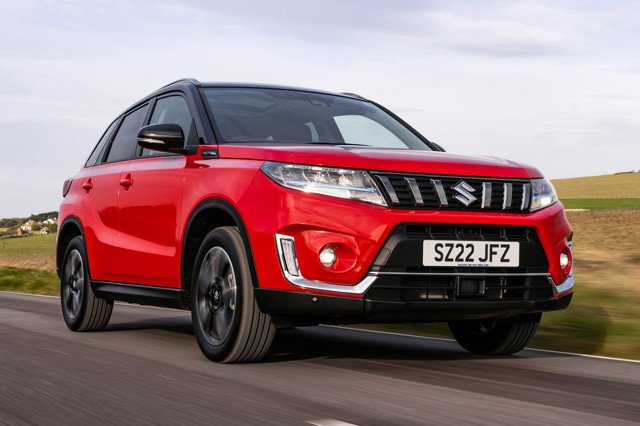
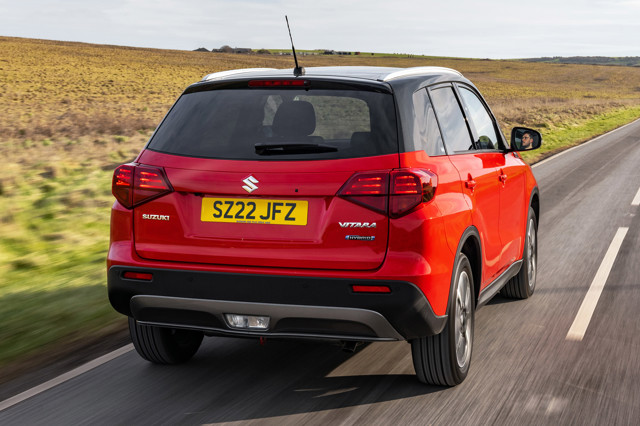
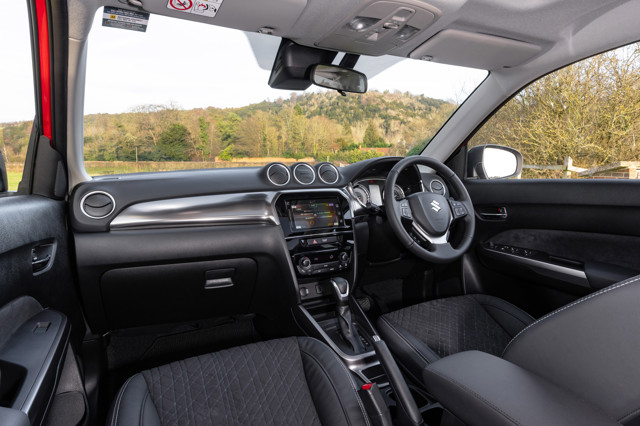
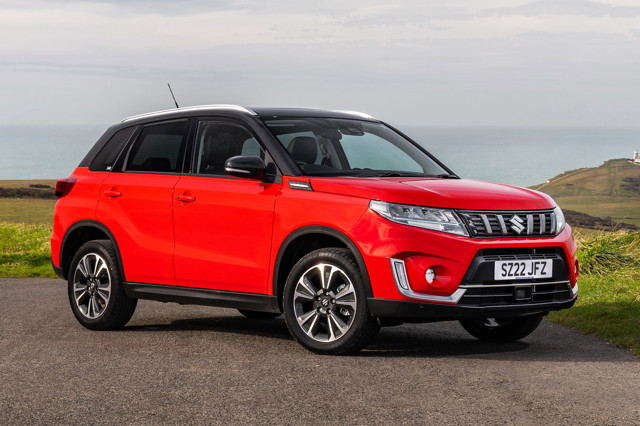
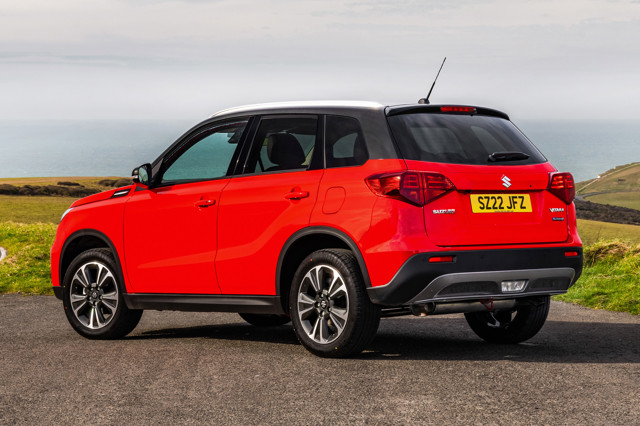
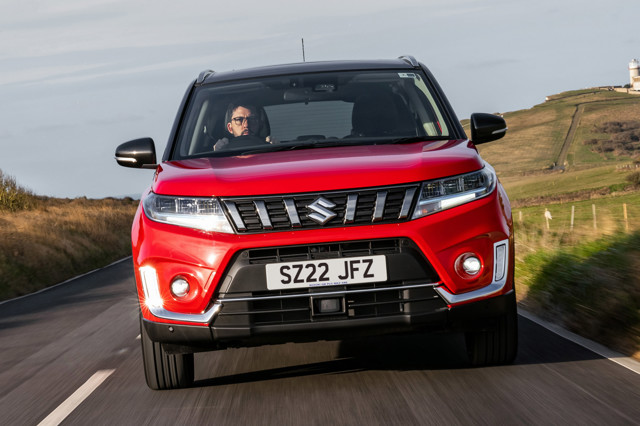
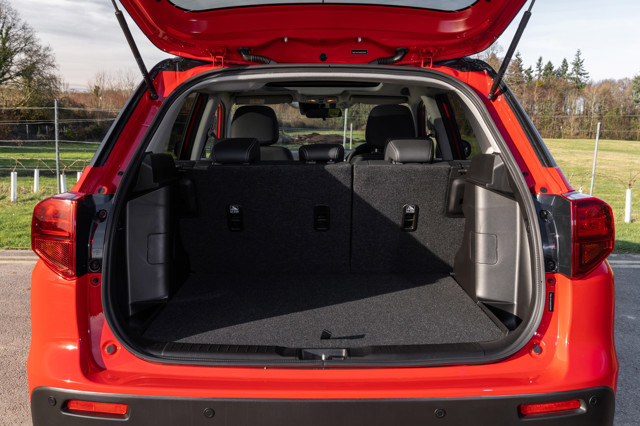


 Spacious interior. Feels like it's built to last. Economical engines including hybrid power from 2022.
Spacious interior. Feels like it's built to last. Economical engines including hybrid power from 2022.
 Feels a bit dated in many ways. Full hybrid gets a frustrating automated manual gearbox.
Feels a bit dated in many ways. Full hybrid gets a frustrating automated manual gearbox.
.jpg?width=240&height=160&rmode=crop)

.JPG?width=240&height=160&rmode=crop)

.jpg?width=240&height=160&rmode=crop)
